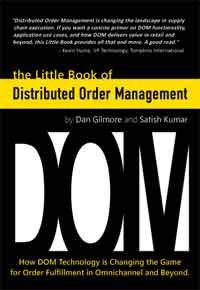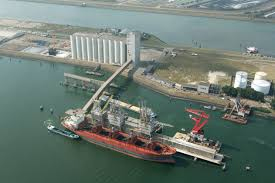The 10 Significant Trends Impacting Businesses - and Supply Chains
The consultants at McKinsey are just out with a set of 10 trends that are impacting businesses - and all 10 seem very applicable to supply chains as well.
So let's take a look.
1. Increased speed, strengthening resilience: McKinsey says that half the respondents in its survey of 2500 executives say their organization are unprepared to react to future shocks. "Those able to bounce forward - and quickly - out of serial crises may gain significant advantages over others," McKinsey says.
| GILMORE SAYS: |
WHAT DO YOU SAY?'
There appears to besome real green shoots seem to be growing, even if many are being fertilized with government money.
Send us your
Feedback here
|
In fact, the report says those companies that had high resilience - without explaining how that was measured - saw shareholder returns 50% higher than the average company in 2020 through 2021.
2. "True hybrid" - The new balance of in-person and remote work: Since the COVID-19 pandemic, about 90% of organizations have embraced a range of hybrid work models that allow employees to work from off-site locations for some or much of the time. McKinsey says it's important that organizations provide structure and support around the activities best done in person or remotely.
McKinsey notes that 4 out of 5 employees that have worked under this model want to keep it.
3. Making way for applied AI: AI is more than just a potential opportunity to boost a company's operations; it can also be used to build better organizations. Companies are already using AI to create sustainable talent pipelines, drastically improve ways of working, and make faster, data-driven structural changes.
McKinsey says that companies have double the use of AI from 2018.
Obviously, there are many supply chain roles that are at risk from AI, and perhaps more specifically the even smart Chat-GPT variety. From demand planners to dispatchers to maybe even wave planners in a distribution center, jobs are at risk. A recent study by OpenAI, inventor of Chat-GPT, said that 100% of accounting jobs are at risk from its technology, among other depressing news.
AI will transform supply chains just like everything else, for better or worse.
4. New rules of attraction, retention, and attrition: McKinsey says workers are revising their attitudes both to work and at work. Organizations can respond by tailoring employee value propositions to individualized preferences in ways that can help close the gap between what today's workers want and what companies need.
This it seems to me applies to both white and blue collar employees. Research from warehouse staffing firm ProLogistix, by the way, show distribution workers now value schedule flexibility almost as much as wave levels.
5. Closing the capability chasm: McKinsey says that companies often announce technological or digital elements in their strategies without having the right capabilities to integrate them. To achieve a competitive advantage, organizations need to build institutional capabilities - an integrated set of people, processes, and technology that enables them to do something consistently better than competitors do.
I guess we can all agree with that. Just how you do that, especially in the supply chain, is the tough question.
 6. Walking the talent tightrope: Business leaders have long walked a talent tightrope - carefully balancing budgets while retaining key people, McKinsey notes. In today's uncertain economic climate, they need to focus more on matching top talent to the highest-value roles. McKinsey research shows that, in many organizations, between 20 and 30% of critical roles aren't filled by the most appropriate people. 6. Walking the talent tightrope: Business leaders have long walked a talent tightrope - carefully balancing budgets while retaining key people, McKinsey notes. In today's uncertain economic climate, they need to focus more on matching top talent to the highest-value roles. McKinsey research shows that, in many organizations, between 20 and 30% of critical roles aren't filled by the most appropriate people.
7. Leadership that is self-aware and inspiring: McKinsey says that leaders today need to be able to lead themselves, lead a team of peers in the C-suite, and exhibit the leadership skills and mindset required to lead at scale, coordinating and inspiring networks of teams. To do that, they must build a keen awareness of both themselves and the operating environments around them.
Does that describe you, if you are are a supply chain exec, or you're CSCO if not?
8. Making meaningful progress on diversity, equity, and inclusion: Organizations are prioritizing diversity, equity, and inclusion (DEI), but in many cases, the initiatives aren't translating into meaningful progress. To realize DEI aspirations, leaders will need to identify opportunities to make progress both in their organizations and in their communities and broader society, McKinsey says.
9. Mental health - Investing in a portfolio of interventions: This one caught me a bit by surprise to be honest. Maybe that supports the point that this is an area in need of attention. McKinsey says about nine of ten organizations around the world offer some form of well-being program. But global health and well-being scores remain poor. Organizations need to refocus their efforts on systematically addressing the causes of mental-health and well-being challenges; one-off and incremental fixes won't be enough.
10. Efficiency reloaded: They might have saved the best one for last, and certainly this is a supply chain challenge. More than one-third of leaders in the survey list efficiency as a top three organizational priority. Boosting efficiency is about more than managing immediate crises or getting the same work done with fewer resources; it means more effectively deploying resources to where they matter the most.
So there you have it. I must say it's pretty good - and all very relevant to supply chain as well.
What would you add - or delete?
What is your reaction to these supply chain trends? Let us know your thought at the Feedback section below.
|






 6. Walking the talent tightrope: Business leaders have long walked a talent tightrope - carefully balancing budgets while retaining key people, McKinsey notes. In today's uncertain economic climate, they need to focus more on matching top talent to the highest-value roles. McKinsey research shows that, in many organizations, between 20 and 30% of critical roles aren't filled by the most appropriate people.
6. Walking the talent tightrope: Business leaders have long walked a talent tightrope - carefully balancing budgets while retaining key people, McKinsey notes. In today's uncertain economic climate, they need to focus more on matching top talent to the highest-value roles. McKinsey research shows that, in many organizations, between 20 and 30% of critical roles aren't filled by the most appropriate people.


